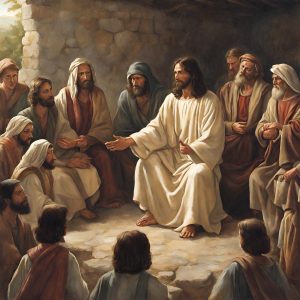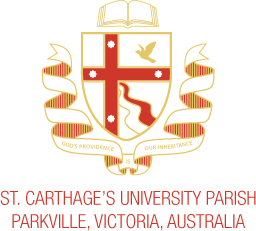Sixth Sunday of Easter Year C
Entrance Antiphon
Proclaim a joyful sound and let it be heard;
proclaim to the ends of the earth:
The Lord has freed his people, alleluia.
First Reading: Acts of the Apostles 15:1-2. 22-29. A reading from the Acts of the Apostles
It has been decided by the Holy Spirit and ourselves not to burden you beyond what is essential.
Some men came down from Judaea and taught the brothers, ‘Unless you have yourselves circumcised in the tradition of Moses you cannot be saved.’ This led to disagreement, and after Paul and Barnabas had had a long argument with these men it was arranged that Paul and Barnabas and others of the church should go up to Jerusalem and discuss the problem with the apostles and elders.
Then the apostles and elders decided to choose delegates to send to Antioch with Paul and Barnabas; the whole church concurred with this. They chose Judas known as Barsabbas and Silas, both leading men in the brotherhood, and gave them this letter to take with them:
‘The apostles and elders, your brothers, send greetings to the brothers of pagan birth in Antioch, Syria and Cilicia. We hear that some of our members have disturbed you with their demands and have unsettled your minds. They acted without any authority from us, and so we have decided unanimously to elect delegates and to send them to you with Barnabas and Paul, men we highly respect who have dedicated their lives to the name of our Lord Jesus Christ. Accordingly we are sending you Judas and Silas, who will confirm by word of mouth what we have written in this letter. It has been decided by the Holy Spirit and by ourselves not to saddle you with any burden beyond these essentials: you are to abstain from food sacrificed to idols, from blood, from the meat of strangled animals and from fornication. Avoid these, and you will do what is right. Farewell.’
Responsorial Psalm: O God, let all the nations praise you!
- O God, be gracious and bless us
and let your face shed its light upon us.
So will your ways be known upon earth
and all nations learn your saving help. (R.)
- Let the nations be glad and exult
for you rule the world with justice.
With fairness you rule the peoples,
you guide the nations on earth. (R.)
- Let the peoples praise you, O God;
let all the peoples praise you.
May God still give us his blessing
till the ends of the earth revere him. (R.)
Second Reading: Revelation 21:10-14, 22-23. A reading from the book of the Apocalypse
He showed me the holy city coming down out of heaven.
In the spirit, the angel took me to the top of an enormous high mountain and showed me Jerusalem, the holy city, coming down from God out of heaven. It had all the radiant glory of God and glittered like some precious jewel of crystal-clear diamond. The walls of it were of a great height, and had twelve gates; at each of the twelve gates there was an angel, and over the gates were written the names of the twelve tribes of Israel; on the east there were three gates, on the north three gates, on the south three gates, and on the west three gates. The city walls stood on twelve foundation stones, each one of which bore the name of one of the twelve apostles of the Lamb.
I saw that there was no temple in the city since the Lord God Almighty and the Lamb were themselves the temple, and the city did not need the sun or the moon for light, since it was lit by the radiant glory of God and the Lamb was a lighted torch for it.
Gospel Acclamation: Alleluia, alleluia! All who love me will keep my words, and my Father will love them and we will come to them. Alleluia!
Gospel: John 14:23-29. A reading from the holy Gospel according to John
The Holy Spirit will teach you everything and remind you of all I have said to you.
Jesus said to his disciples:
‘If anyone loves me he will keep my word,
and my Father will love him,
and we shall come to him
and make our home with him.
Those who do not love me do not keep my words.
And my word is not my own:
it is the word of the one who sent me.
I have said these things to you
while still with you;
but the Advocate, the Holy Spirit,
whom the Father will send in my name,
will teach you everything
and remind you of all I have said to you.
Peace I bequeath to you,
my own peace I give you,
a peace the world cannot give, this is my gift to you.
Do not let your hearts be troubled or afraid.
You heard me say:
I am going away, and shall return.
If you loved me you would have been glad to know that I am going to the Father,
for the Father is greater than I.
I have told you this now before it happens,
so that when it does happen you may believe.’
REFLECTION
Have you noticed how many books, films, television and radio programs harken back to yesteryear? ‘Retrospectives’ are huge in the art world. Have you noticed when musicians play more romantic classical music in the first half and contemporary music in the second half that people leave at half time? It seems the public likes the art of the 19th Century more than that of today. Nostalgia is big business and we cannot get enough of it.
Nostalgia literarily means ‘a yearning for home’. And if our artistic tastes reveal anything about who we are at present, maybe the home we yearn for is where things are clearer, roles are more defined, accepted harmony is developed and discord and dissonance is avoided – at least in public.
In today’s Gospel, Jesus says that as a result of our love for him and fidelity to his word, the Father will come and make a home with us. The image of God as homemaker is, sadly, not very developed in Christian spirituality, maybe because too many undomesticated men have had too much of the say for far too long! But this is an image that holds a lot for how and where we meet God.
The best homes are places where we relax because we are ourselves, we are known and we know the others with whom we live. It’s a common experience, for example, that when we have been out from our homes, as soon as we enter our front door we want to go to the loo. There is something intimate and familiar about our home that enables us to relax on many levels as we turn the key. Home is an earthy place where we don’t get away with much and our vulnerability can be on display. Christian homes are particularly hospitable places, where Christ dwells in them to the degree that dignity, love and forgiveness are present.
A home, however, is more than a house in which people live. Homes need work and attention. A friend of mine says memories rarely just happen, they need to be created. That’s the sort of attention to a family’s life that turns a house into a home.
And this is the world in which God enters our lives. God wants us to be relaxed and vulnerable in God’s presence. We don’t need to put on a show or say what we think God wants to hear, that’s a theatre where we preform, not a home where we know each other. Easter faith is about being comfortable and intimate, about being who we are, rather than the persona we would prefer God to see.
As with most of our homes, being at home with God has its ups and downs, days when we think we cannot bear to stay one more moment, other days where we could never imagine being anywhere else and then most days where we are neither up nor down and we just get on with the routine of our lives. God the homemaker remains faithful through it all, offering the gift of Easter peace, sending us out to proclaim Christ’s Kingdom, welcoming us home eager to learn how everything went and reassuring us always that while God is at home with us our hearts should never be troubled and we are not to be afraid.
For Christians, nostalgia is not about living in the past, it is about yearning for the sort of home where our heart truly is.
© Richard Leonard SJ
